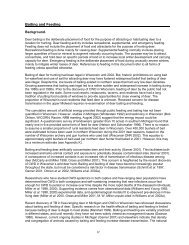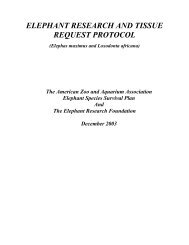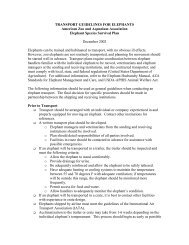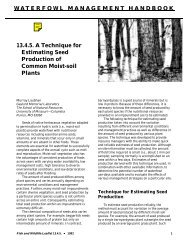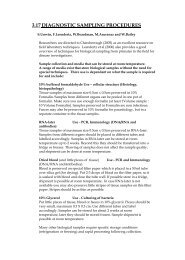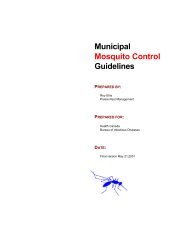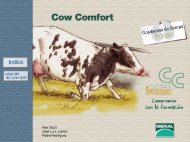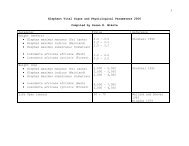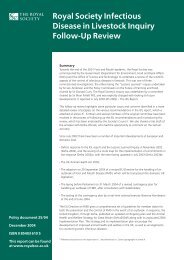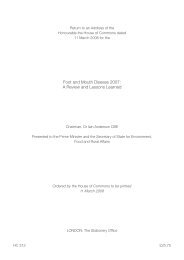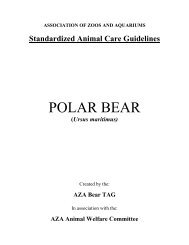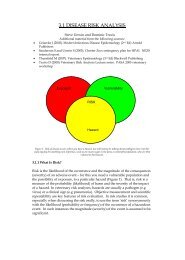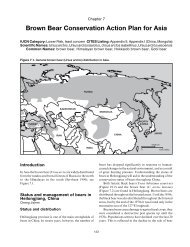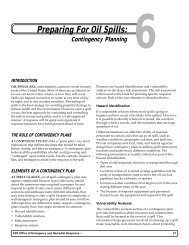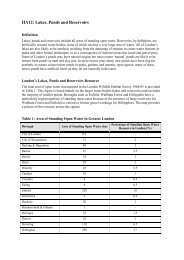Elephants Elephants - Wildpro - Twycross Zoo
Elephants Elephants - Wildpro - Twycross Zoo
Elephants Elephants - Wildpro - Twycross Zoo
You also want an ePaper? Increase the reach of your titles
YUMPU automatically turns print PDFs into web optimized ePapers that Google loves.
108<br />
and Rural Affairs (DEFRA) and the latest BIAZA Animal Transaction Policy<br />
(British and Irish Association of <strong>Zoo</strong>s and Aquariums 2005a).<br />
<strong>Elephants</strong> MUST be transported only for breeding, movement between zoos<br />
and veterinary purposes and with TAG/EEP approval. Movement for any<br />
other purposes MUST be cleared by the TAG and BIAZA. Collections MUST<br />
inform BIAZA of any pending animal movements, so that the office can be<br />
prepared for media or other interest.<br />
During transportation, elephants should periodically be given access to food<br />
and water. Hay can be given as appropriate to occupy them throughout the<br />
journey. <strong>Elephants</strong> should always be given water, food or branches within the<br />
same period as the drivers’ compulsory rest period.<br />
Route Planning<br />
It is essential prior to any move that the route is planned. Time of travel can<br />
be estimated this way and likely delays can be accounted for. All relevant<br />
bodies and authorities should be informed of the planned route. This is<br />
especially important if any country borders are to be crossed, so that time is<br />
not lost at a border, by either customs or veterinary controls. When crossing<br />
borders it is essential that the originals of all permits are carried.<br />
If the journey is likely to exceed 10 hours (drivers’ hours/tacho regulations) in<br />
length, a suitable place to stop should be organised prior to the journey so that<br />
the driver and elephant can be rested. If possible night stops should be<br />
planned at a zoo, for supplies of fresh food and water and for security reasons.<br />
A regular removal of dung and wet material is essential in longer trips.<br />
Consideration should be made of the likely prevailing weather conditions,<br />
especially with regard to heat and cold. Telephone numbers of suitably<br />
experienced vets en route should also be prepared and a reliable mobile<br />
telephone is essential.<br />
Preliminary Considerations<br />
If appropriate it would be strongly advised that the places of loading and<br />
unloading be assessed prior to the move.<br />
Factors to be considered at the time:<br />
• Access to zoo/collection.<br />
• Access to elephant house/yard. (It is good policy to access the loading<br />
and unloading facilities in advance to check for unforeseen access<br />
problems with vehicle or crane, and also to check for security<br />
problems).<br />
• Suitability of elephant house/yard for loading and unloading elephants<br />
i.e. elephant and keeper safety. Adjustments to the facilities might be<br />
necessary prior to the move.<br />
• Assessment of elephants, factors to be considered refer to loading and<br />
unloading elephants. This should be carried out in advance of<br />
transportation by those personnel destined to move the elephant/s.<br />
The extent to which the elephants are trained for loading may be<br />
critical.



